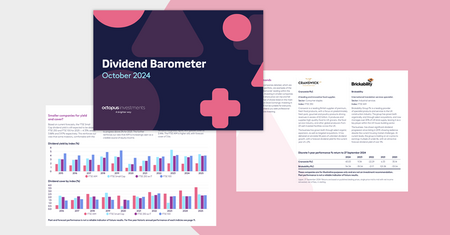Four reasons to recommend investments in early-stage companies
Investing in early-stage companies could be a great opportunity for your clients.
Clients should be comfortable with the additional risks they bring.
Why advise on early-stage investments? Here’s an adviser’s view…
Reason 1: A growth opportunity
When someone invests in a company at its initial public offering, there’s a good chance they’ve already missed out on some of the fastest growth that company will ever see.
While there are significant risks when investing in a very young business, that goes hand-in-hand with the potential for significant growth.
By virtue of being small, early-stage businesses have room for substantial growth. They can also be attractively priced, because many big investors and institutions look to invest in established companies with proven returns rather than higher risk small businesses. Should things go well for these businesses, and those large investors later enter the market, they tend to push up the share price.
Taking the risk of backing a company in the early stages of its growth means investors can maximise the growth opportunity. What’s more, the UK is a very attractive market for early-stage investments.
Britain is renowned for nurturing young innovative companies. The UK is now only behind the US and China for creating unicorns, which are private businesses valued at over $1 billion (£722 million).
Recent success stories include second-hand fashion app Depop, purchased by US e-commerce giant Etsy in a deal worth $1.6 billion. Another is online used car retailer Cazoo, which listed on the New York Stock Exchange.


Reason 2: Make the most of tax reliefs
There is a way clients can invest in smaller companies and claim tax reliefs to compensate for some of the risk they take. These tax reliefs can be useful to support a client’s tax and financial planning.
Some small, early-stage companies qualify for investment under the Enterprise Investment Scheme (EIS) or through a Venture Capital Trust (VCT).
For clients, investing in a portfolio of EIS-qualifying companies or a VCT provides access to smaller companies and a number of tax reliefs.
These two routes will suit the needs of different clients:
Enterprise Investment Scheme (EIS)
Investments that qualify for EIS, involve exciting, progressive young businesses that offer the potential for strong growth. Because these companies carry greater risk for investors, attractive tax reliefs can be claimed.
With an EIS service, investors typically own shares directly in a concentrated portfolio of 1—15 early-stage companies. This concentration means where a company succeeds, investors can really feel the impact of the growth. Equally, any losses will be felt more sharply.
EIS investments have the following valuable tax benefits to compensate for some of the risks of investing in early-stage businesses: 30% upfront income tax relief, tax-free growth, loss relief that can be claimed against income or gains, and the ability to defer capital gains made on the sale of other assets. EIS shares also qualify for relief from inheritance tax.
Venture Capital Trust (VCT)
VCTs are listed companies that invest in a large diversified portfolio of 20—90 early-stage businesses. Investors can claim up to 30% upfront income tax relief on their investment. When a VCT pays out a dividend, or if an investor’s VCT shares have grown in value when they come to sell, this is also tax-free.
Risks to bear in mind
The value of an investment, and any income from it, can fall as well as rise. Investors may not get back the full amount they invest.
Smaller company shares are by their nature high risk, their share price may be volatile and they may be hard to sell.
Tax treatment depends on individual circumstances and tax rules could change in the future.
Tax relief depends on portfolio companies and VCTs maintaining their qualifying status.
Reason 3: Exciting, agile companies which diversify a portfolio
You might hear a client say, “Cazoo is one of my investments.”
But it’s less likely a client will feel this kind of connection to the larger listed stocks they hold.
While smaller companies may be a small part of an investor’s overall portfolio, it’s quite common for clients to take a disproportionate level of interest in this area of their investments. That’s natural. Smaller companies tend to be at the forefront of emerging trends, innovating, and shaping the future. And clients can participate in their exciting growth journeys.
Why does that matter?
Well, smaller company investing is a chance to deepen the relationship you have with your client. The client can experience a greater sense of ownership of their investments, and this can help you demonstrate the value you add as their adviser.
It’s also important because smaller companies can offer genuine diversification. Investing in EIS or VCT-qualifying companies allows clients to access investments they won’t normally hold anywhere else.
Many early-stage companies are unquoted, private businesses. Investing in these types of companies is not for every client. However, unquoted investments can bring unique qualities to a long-term portfolio of investments.
Because the share prices of unquoted companies are less affected by stock market sentiment, these investments aren’t as susceptible to volatility caused by the emotions of the herd, as can be the case with listed stocks.
Because smaller companies are less established, they have a higher rate of failure. But this doesn’t mean all smaller companies aren’t resilient. In fact, some early-stage companies can adapt better to shocks than large companies and this helps to diversify a client’s portfolio. When shocks do occur, such as a global pandemic, smaller companies can often be nimble and agile because of their size. New businesses also tend to operate on more modern, technology-driven business models, meaning they can often react quickly to challenging conditions.

Exciting early-stage companies
These are some of the exciting companies investors have accessed through Octopus Ventures, one of the largest venture capital teams in Europe. The team manages a range of products, including the Octopus Ventures EIS Service and Octopus Titan VCT, the UK’s largest VCT.
Example companies are shown for illustrative purposes only and are not an investment recommendation. This article is an advertisement and not a prospectus. Any decision to invest should only be made on the basis of the information contained in the prospectus and the Key Information Document (KID), available in the resources section of this website.

Reason 4: Broad support for the UK economy
Small businesses are the backbone of the UK and a critical part of the economy.
Investments in smaller companies provide capital to vibrant entrepreneurs looking to change industries, stimulate the economy and create jobs.
Government-approved investments such as EIS and VCTs play an important role in making sure these companies are given the best chances of growing and succeeding. This is especially true when the wider economy needs stimulus.
For example, since January 2020, when Covid-19 reached the UK, Venture Capital Trusts have invested more than £695 million in small UK businesses.¹
Clients can feel confident that they are helping to nurture young businesses across the UK that may be the next generation of pioneers.
Data from the Venture Capital Trust Association shows that for the year ended May 2020, early-stage companies:
Invested £534 million on research and development
Employed more than 77,000 people
We’re here to support you
If you’ve got a question about any of our products or services, please get in touch.
Contact our team
Got a question?
Call us at 0800 316 2067




